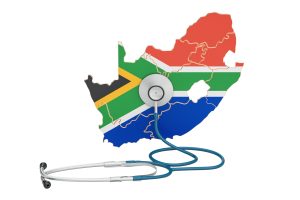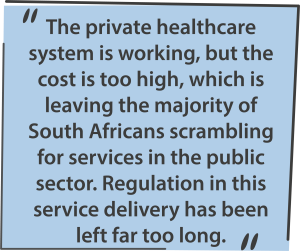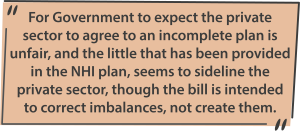The National Health Insurance Act
 Zee Gumede
Zee Gumede
Healthcare Consultant
_______________________________________________________________________________________________________
Constitutional rights and the intention of NHI
 On 15 May 2024, President Cyril Ramaphosa signed the NHI Bill into law. On 16 May 2024, the NHI Act was gazetted, though no effective dates were stipulated.
On 15 May 2024, President Cyril Ramaphosa signed the NHI Bill into law. On 16 May 2024, the NHI Act was gazetted, though no effective dates were stipulated.
According to the South African Constitution in Section 27, everyone has the right to healthcare services including reproductive healthcare services, and no one may be refused emergency medical treatment.
The intention of the NHI is to achieve universal health coverage for all South Africans, specifically referencing financial health coverage. The sixth government administration since 1994 promulgated the NHI, stating that they believed that extending health coverage for all South Africans would improve access to care, quality of care and continuity of care. They also believed that NHI reforms will contribute to the health system having a co-ordinated and well-structured response to the burden of disease.
Political context and challenges
On 29 May 2024, South Africans went to the polls, resulting in the watershed moment when, for the first time in 30 years, there was no outright winner. The incoming seventh administration, housed now in the Government of National Unity, (GNU), has differing views to the sixth administration. It will be interesting to see how the majority party will find common ground, where their ideologies are concerned, as their biggest partner in the GNU cited litigation processes, against the proposed NHI Act, before the GNU was formed.
Although the NHI Bill is commended for creating access to universal health coverage for all South Africans, its implementation will undoubtedly face many funding and legal challenges which will likely delay implementation by several years.
Inequality and the health sector
Inequality in South Africa is a major negative contributor to equal access and quality healthcare. Based on the Gini coefficient, a widely used statistical measure of how income is distributed in the population of a country, South Africa has the highest income inequality in the world, with a co-efficient of 0.67.
Impact on medical schemes and employment
There are 71 medical schemes in South Africa, with approximately 8.9 million members who will be affected by NHI. Medical aid schemes will not be able to offer any services that are being offered by NHI. There are currently 16.7 million employed South Africans who will need to take care of 60 million South Africans.
International comparisons
Some countries that currently operate national health schemes of one sort or another include Australia, Sweden, Brazil, Canada, Denmark, France, Germany, Norway, United Kingdom, Israel, Italy and Japan. According to Joe Cronin, Founder and President of International Citizens Insurance, the top-performing countries overall that are delivering, where healthcare is concerned, are Norway, the Netherlands and Australia. The United States ranks last overall, despite spending far more of its gross domestic product on healthcare.
Perspectives on NHI from GTC staff
Several of GTC’s staff members were asked to table their views and questions regarding the NHI. It was interesting to note the different perspectives put forward by these same staff. Several of these comments have been included relatively unabridged. They are included to illustrate the wide divergence of expectations and support for this scheme. These opinions do not necessarily represent a GTC perspective.
Need for Private Sector Involvement
Regulation and the private healthcare industry
Cost of private healthcare
Concerns about NHI plan
Trust issues and centralisation of medical schemes
Impact on group risk contributions













